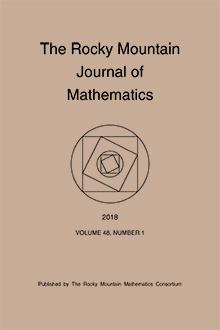Abstract
Given a finite set , define
The set is said to be MPTQ (more product than quotient) if and MSTD (more sum than difference) if . Since multiplication and addition are commutative while division and subtraction are not, it is natural to think that MPTQ and MSTD sets are very rare. However, they do exist. This paper first shows an efficient search for MPTQ subsets of and proves that as , the proportion of MPTQ subsets approaches . Next, we prove that MPTQ sets of positive numbers must have at least elements, while MPTQ sets of both negative and positive numbers must have at least elements. Finally, we investigate several sequences that do not have MPTQ subsets.
Citation
Hùng Việt Chu. "On sets with more products than quotients." Rocky Mountain J. Math. 50 (2) 499 - 512, April 2020. https://doi.org/10.1216/rmj.2020.50.499
Information





